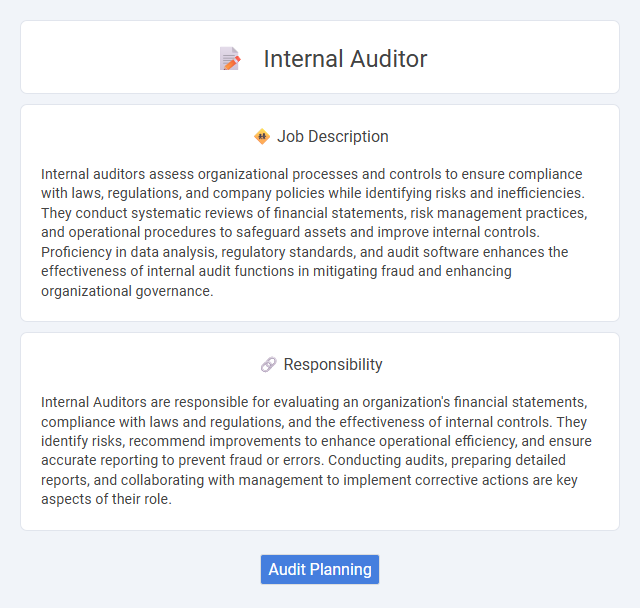
Internal auditors assess organizational processes and controls to ensure compliance with laws, regulations, and company policies while identifying risks and inefficiencies. They conduct systematic reviews of financial statements, risk management practices, and operational procedures to safeguard assets and improve internal controls. Proficiency in data analysis, regulatory standards, and audit software enhances the effectiveness of internal audit functions in mitigating fraud and enhancing organizational governance.
Individuals with strong analytical skills and attention to detail are likely to thrive in an internal auditor role, as it demands thorough examination of financial records and compliance. People who are comfortable with scrutiny and have a high level of integrity may find this position suitable, given the ethical responsibilities involved. Those who prefer dynamic, people-focused roles might find the structured, process-driven nature of internal auditing less aligned with their strengths.
Qualification
Internal Auditors must possess a bachelor's degree in accounting, finance, or a related field, often complemented by professional certifications such as Certified Internal Auditor (CIA), Certified Public Accountant (CPA), or Certified Information Systems Auditor (CISA). Strong analytical skills, proficiency in auditing software, and a thorough understanding of risk management, compliance regulations, and internal control frameworks like COSO are essential. Experience in financial reporting, data analysis, and knowledge of industry-specific standards further enhance an Internal Auditor's qualification profile.
Responsibility
Internal Auditors are responsible for evaluating an organization's financial statements, compliance with laws and regulations, and the effectiveness of internal controls. They identify risks, recommend improvements to enhance operational efficiency, and ensure accurate reporting to prevent fraud or errors. Conducting audits, preparing detailed reports, and collaborating with management to implement corrective actions are key aspects of their role.
Benefit
An internal auditor role likely offers significant benefits such as enhancing organizational transparency and improving risk management strategies, which could lead to increased operational efficiency. The position might provide valuable insights into financial controls and compliance, potentially reducing the likelihood of fraud and errors. Professionals in this field may experience career growth opportunities due to their critical role in supporting governance and decision-making processes.
Challenge
Internal Auditor roles often face the challenge of detecting subtle financial discrepancies and ensuring compliance within complex organizational structures. The probability of encountering resistance from departments during audits may increase, requiring strong communication and negotiation skills. Balancing thorough risk assessments with time constraints is likely to be a consistent hurdle in maintaining audit quality and accuracy.
Career Advancement
Internal Auditors play a crucial role in evaluating and improving an organization's risk management, control, and governance processes, often leading to opportunities for career advancement into senior audit roles, risk management, or compliance positions. Mastery of audit software, strong analytical skills, and certifications like CIA (Certified Internal Auditor) or CPA (Certified Public Accountant) significantly enhance promotion prospects. Progression often includes roles such as Internal Audit Manager, Director of Internal Audit, or Chief Audit Executive, offering increased responsibility and influence over strategic decision-making.
Key Terms
Audit Planning
Internal auditors play a crucial role in audit planning by designing risk-based audit strategies that align with organizational goals and compliance requirements. They analyze financial data, operational processes, and control environments to identify high-risk areas and allocate resources efficiently. Effective audit planning improves regulatory compliance, enhances internal controls, and supports strategic decision-making within enterprises.
 kuljobs.com
kuljobs.com